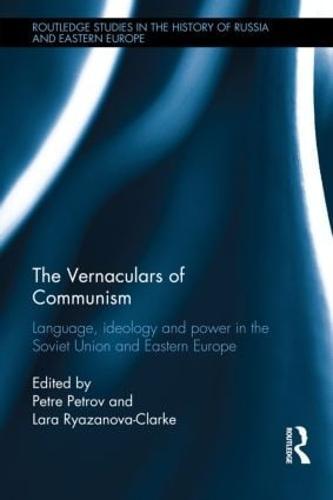Overview
The political revolutions which established state socialism in the Soviet Union and Eastern Europe were accompanied by revolutions in the word, as the communist project implied not only remaking the world but also renaming it. As new institutions, social roles, rituals and behaviours emerged, so did language practices that designated, articulated and performed these phenomena. This book examines the use of communist language in the Stalinist and post-Stalinist periods. It goes beyond characterising this linguistic variety as crude ""newspeak"", showing how official language was much more complex – the medium through which important political-ideological messages were elaborated, transmitted and also contested, revealing contradictions, discursive cleavages and performative variations. The book examines the subject comparatively across a range of East European countries besides the Soviet Union, and draws on perspectives from a range of scholarly disciplines – sociolinguistics, anthropology, literary and cultural studies, historiography, and translation studies. Petre Petrov is an Assistant Professor in the Department of Slavic Languages and Literatures at the University of Texas at Austin. Lara Ryazanova-Clarke is Head of Russian and Academic Director of the Princess Dashkova Russia Centre in the School of Literatures, Languages and Cultures at the University of Edinburgh.
Full Product Details
Author: Petre Petrov (Princeton University, USA) ,
Lara Ryazanova-Clarke (Edinburgh University, UK)
Publisher: Taylor & Francis Ltd
Imprint: Routledge
Dimensions:
Width: 15.60cm
, Height: 1.80cm
, Length: 23.40cm
Weight: 0.476kg
ISBN: 9781138792357
ISBN 10: 1138792357
Pages: 244
Publication Date: 17 December 2014
Audience:
College/higher education
,
Tertiary & Higher Education
,
Undergraduate
Format: Hardback
Publisher's Status: Active
Availability: In Print

This item will be ordered in for you from one of our suppliers. Upon receipt, we will promptly dispatch it out to you. For in store availability, please contact us.
Reviews
...this is a book that should be read not only by students of linguistics but also by anyone interested in the problems of the `captive mind', so eloquently revealed at the time of Stalin's death by Czeslw Milsz. Martin Dewhirst, University of Glasgow, Slavonic and East European Review
...this is a book that should be read not only by students of linguistics but also by anyone interested in the problems of the `captive mind', so eloquently revealed at the time of Stalin's death by Czeslw Milsz. Martin Dewhirst, University of Glasgow, Slavonic and East European Review
...this is a book that should be read not only by students of linguistics but also by anyone interested in the problems of the 'captive mind', so eloquently revealed at the time of Stalin's death by Czeslw Milsz. Martin Dewhirst, University of Glasgow, Slavonic and East European Review
Author Information
Petre Petrov is an Assistant Professor in the Department of Slavic Languages and Literatures at the University of Texas at Austin. Lara Ryazanova-Clarke is Head of Russian and Academic Director of the Princess Dashkova Russia Centre in the School of Literatures, Languages and Cultures at the University of Edinburgh.




